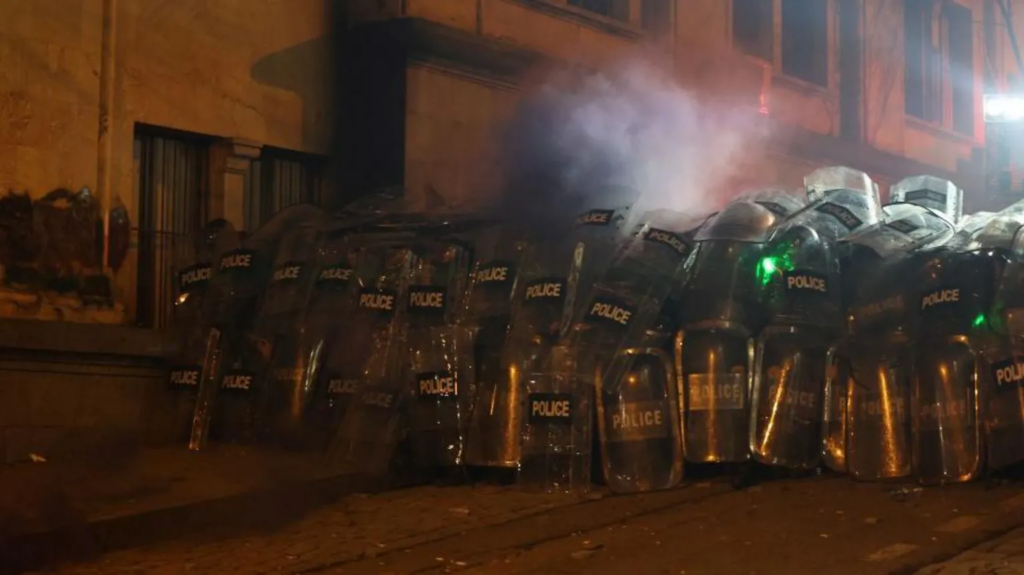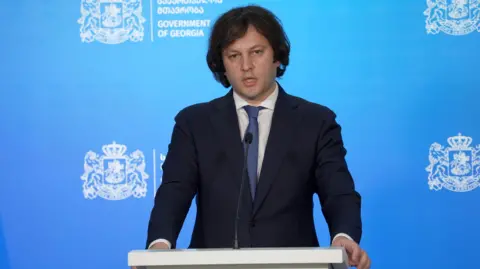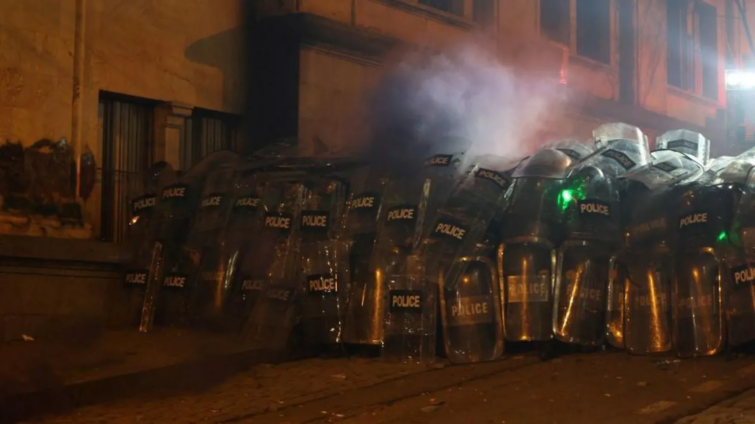Georgia has seen a fourth night of street demonstrations and a string of public resignations, triggered by the ruling party's decision to suspend a push to start talks on joining the European Union.
As tens of thousands of Georgians headed back to the streets of several cities, Prime Minister Irakli Kobakhidze said they had fallen victim to opposition lies and he rejected calls for new elections.
He confirmed reports that Georgia's ambassador to the US, David Zalkaliani, had become the latest senior diplomat to stand down, explaining that he had come under considerable pressure.
But Kobakhidze sought to deny the reason for the protests, saying on Sunday that "we have not suspended anything, it's a lie".
Only three days before, his party Georgian Dream had accused the EU of using talks on joining the union as "blackmail" and said the government had decided not to put that issue on the agenda until the end of 2028.
Pro-EU protesters were out in big numbers again on Sunday night, and when fireworks were aimed at the parliament building as well as riot police, the police responded with water cannon. Large groups of riot police huddled in side streets beside parliament, and it was not until late into the night that reports emerged of clashes with demonstrators.

Georgia's increasingly authoritarian government has been accused by the EU and US of democratic backsliding. On Saturday, the US took the significant step of suspending its strategic partnership with Georgia.
Kobakhidze insisted that Georgian Dream was still "committed to European integration... and we are continuing on our path to the European dream".
And yet an increasing array of public officials do not appear to believe that is the case. Several ambassadors have resigned, and hundreds of civil servants and more than 3,000 teachers have signed letters condemning the decision to put EU accession on hold.

Many Georgians have been shocked by the level of violence directed at Georgian journalists as well as protesters. Dozens of reporters have been beaten or pepper sprayed and some have needed hospital treatment.
Georgia's human rights ombudsman Levan Ioseliani said "this is brutality", and he appealed to police not to abuse their power.
The prime minister said it was opposition groups and not the police that had meted out "systemic violence".
Georgian ex-ambassador to the EU Natalie Sabanadze, now at Chatham House in the UK, believes the level of violence, the string of resignations and civil disobedience indicate a "qualitative change" to the protests now taking place.
"Maybe [the government] thought people would be scared, but it's not working out like this," she told the BBC. "Yesterday civil society activists and artists went to the public broadcaster and took it over and forced their way into the live stream. I've seen this before, in pre-revolutionary Georgia [in 2003]."
Georgia's pro-Western president, Salome Zourabichvili, is due to step down in a matter of weeks, however, since last month's contested parliamentary elections which opposition parties have denounced as rigged, she has become a powerful figurehead, rallying protesters against the government and calling for a new vote.
Latest Stories
-
Africa Food Systems Parliamentary Network urges governments to increase investment in agriculture
6 hours -
AU and partners urge youth to get involved in efforts to transform continent’s food systems
6 hours -
Fire kills 3-year-old at Asawase-Dagomba Line in Ashanti Region
7 hours -
Paskal A.B. Rois: How Mahama inspires me
7 hours -
Complete abandoned projects in Akatsi North District – Chiefs to Mahama
7 hours -
Painter and sculptor B. Acheampong turning his passion for art into profitable venture
8 hours -
Presidential lodge, RM residency in Ashanti region left to rot away
8 hours -
Herty Corgie highlights the essence of gratefulness in ‘My Gratitude’
10 hours -
ANNOUNCEMENT: Joy FM temporarily goes off air January 11
10 hours -
Yango honored with two titles at the Technovation Africa Awards 2024
11 hours -
Aowin Traditional Council declares war on illegal mining with spiritual intervention
11 hours -
Leadership must ensure equity for all citizens, regardless of faith – Asiedu Nketiah
11 hours -
Prof. Alex Manu appointed Executive Director at Centre for Social Justice
11 hours -
Imminent changes within some key security agencies, state institutions, and its implications
11 hours -
There are more women than men, but there’s a man for every woman – Rev. Nana Yaa
11 hours

